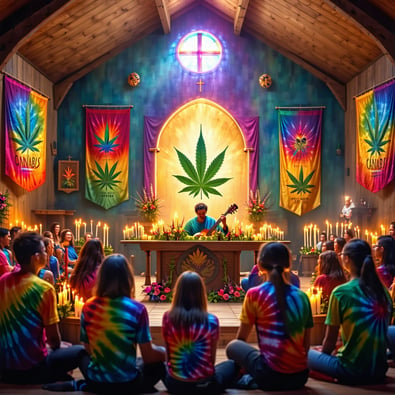Other religions state that while it can be used for medicinal purposes it is also banned in their community.
For some religious communities, cannabis is an integral part of their religious practices.
Other religions state that while it can be used for medicinal purposes it is also banned in their community.
Lew Manning (pictured), who has been a Rastafarian since 2007, said in the Rastafari community, cannabis is a herb created by God and it has many uses.
“There are many uses of cannabis. One of them is that we smoke it in thanks to his majesty. We pray before it is used and after we use it. We pray as we are thanking God for what he created. Plants were created first before anything. We show respect for the cannabis plant when we pray. There is no rule about how much we can smoke,” said Manning.
He said his routine involves smoking cannabis when he prays, gathering with family or before starting work.
“When I wake up in the morning, I give thanks. I use a gram of marijuana and I give thanks again.
Before I open my stall, we give thanks and smoke again with the people who are around. I smoke around five to six times a day. We smoke from the direction of the hearticle [heart] which is why we pass it to the left. We meet on a Saturday for the Sabbath. We smoke as we gather, then the seven priests come in and read the seven psalms. They then smoke from the Khush. spliffs or other items like bongs are also passed around and the chanting begins. The chanting continues for three to four hours. We then have a break and drink or eat food that everyone brings.
“Using cannabis during the Sabbath is different for each person. Some use it when they are doing a silent fast. When we see that they are quiet then we won’t talk to them. Some use it at the start of the Sabbath and others at the end,” said Manning.
Myths associated with Cannabis
Manning said there are different myths associated with the use of cannabis, however, it has many health benefits. From his experience he said that cannabis is very calming.
“People think we are crazy for smoking cannabis but it has many benefits. It has many health benefits. Cannabis can heal many different illnesses and ailments such as asthma and body aches. We also make a tea with it. This also helps to cleanse the body and take care of ourselves which is very important as a Rastafari,” said Manning.
Manning added that young children in a Rastafarian home or community are not forced to smoke cannabis but rather make the decision on their own.
We smoke around the home and at family gatherings. They do know that we smoke it and we pass it around. If they try when they are older and they decide on their own to smoke it, we then give them their own chalice and they continue. We rather give it when they ask us for cannabis rather than them looking for other drugs elsewhere which have a far worse impact, like tik and whoonga,” said Manning.
Pundit Lokesh Maharajh, chairperson of the Priest’s Councils SA Hindu Maha Sabha, said that intoxication is forbidden and that cannabis is seen as an intoxicant.
Cannabis for Hinduism
“Intoxication is viewed as a sin in the foundational texts of Hindu Dharma (Hinduism).
“According to the Atharva Veda, people who use intoxicants lose their intellect, talk nonsense, get naked and fight with each other. Weak minds are drawn to flesh, wine, sensuality and womanising, according to the Rig Veda. Cannabis and all other intoxicants are prohibited in Hinduism,” said Maharajh.
Maharajh dispelled the myth that cannabis is used by one of the sacred beings. “One of the cannabis myths is that Lord Shiva consumes “bhang” [paste made from the crushed leaves and blooming tops of cannabis] and smokes pot.
Bhang is a symbolic representation of intoxication within a person, and it is offered to Lord Shiva.” The devotee proclaims when giving bhang: “I give you my intoxication related to maya [illusion] and bad habits.
“The scriptures on Lord Shiva are against all types of rajasic [foods that create mental restlessness] and tamasic [sedative meals that hurt both the body and the mind when ingested]. Shiva is linked to everything in the universe, but bhang is linked because of its potent Ayurvedic properties,” said Maharajh.
He said bhang is used in Ayurveda to cure health problems but excessive use is forbidden.
Religious leader Mohamed Saeed said the use of intoxicants, such as cannabis, is not condoned according to Islamic Law known as Shariah.
However, according to scholars, cannabis for medical use is allowed.
“Marijuana/dagga/ cannabis is an intoxicant and supports the ruling of prohibition as is the case of all other intoxicants such as cocaine, opium, mandrax, amphetamines, alcohol, etc. Prophet Muhammed (PBUH) prohibited every intoxicant … which weaken an individual’s mind or body.
According to some scholars, using medical cannabis for medicinal purposes is viewed as permissible, provided a physician with a sound knowledge of the Islamic religion advises such usage and there is no halaal [permissible] alternative available to treat the illness. The use of cannabis products like oils, creams, hair shampoos, etc., must not contain hallucinogenic or forbidden substances and will only be permissible if they do not lead to intoxication,” said Saeed.
Saeed said cannabis is not used in Islamic religious practices.
“Islam as a way of life promotes the preservation of life and dignity, safety and wellbeing of the human body and prescribes what we can eat and drink, hence any substance that makes an individual behave or act in a malevolent manner or cause injury or harm to either oneself or society is not allowed in Islam,” said Saeed.




